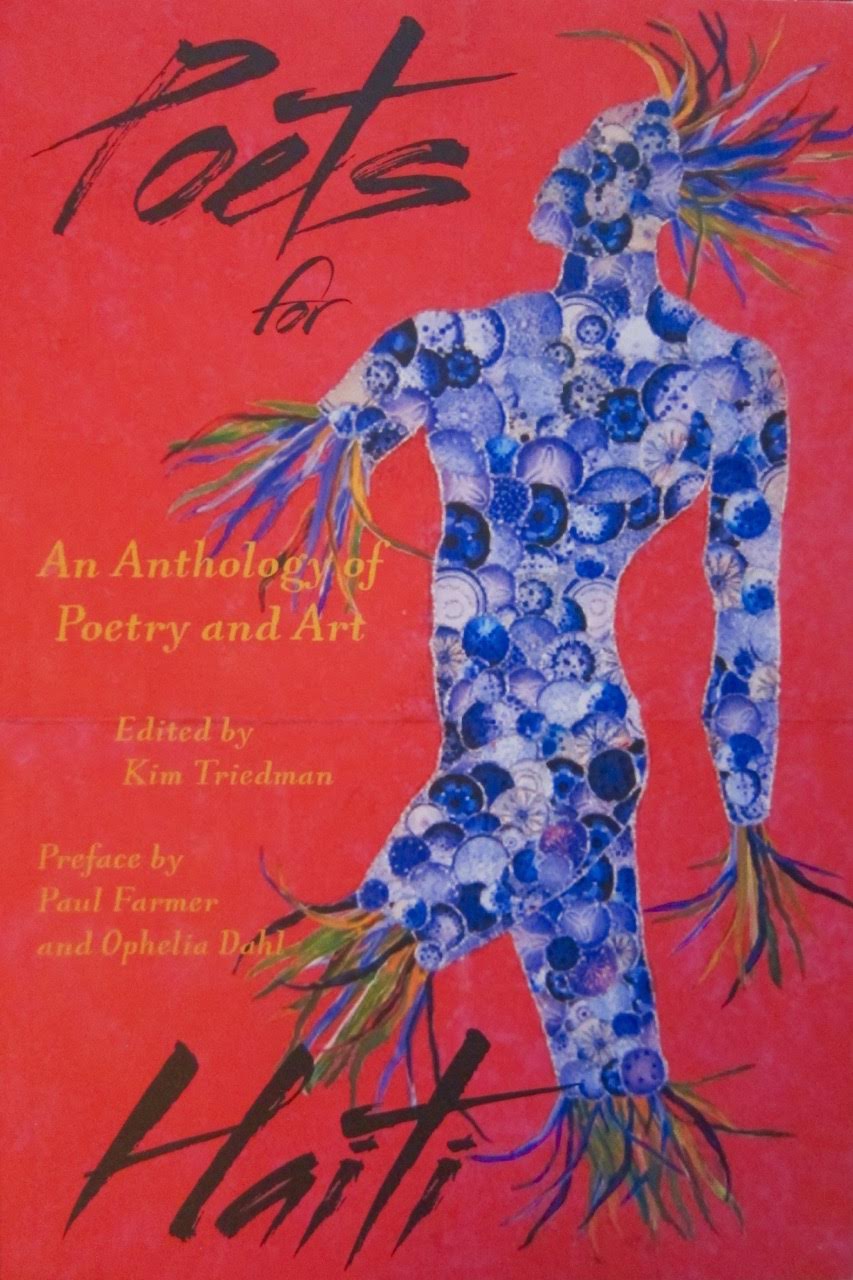The Fall of Sanctuaries
I was a child who gazed at the sky.
Each time we drove past the Church of the Sacred Heart of Jesus in Port-au-Prince, my eyes met with Christ.
I never missed the chance, as we passed the church, to look up,
contemplate the immense Christ who stood on top of the steeple, weightless, lifted on a cloudless sky, graceful and white
against the blue, blue, forever blue vastness, there for all time, arms opened wide, extended like branches of a tree on which we would all
rest.
Yet, on January twelfth 2010, the Port-au-Prince sky let go of its Christ. The roof over all saints who long ago presided over my First Communion vows at Sacred Heart collapsed in on itself.
God’s son now lies face down, open arms embracing dirt.
All roofs over all saints protecting the whole city collapsed onto us all—the roof over the Cathedral with the stained glass angels collapsed onto the Archbishop of God, its rose window now deserted like
the bloodied eye of a Cyclops.
The roof of Saint Anne’s Church collapsed onto maimed creatures who clustered at the parvis like
frayed undergrowth begging for alms.
The roof of the Church of Saint Trinity collapsed onto empty pews, dropping its mural of the Nativity and the company of heaven—
gone are the angels, gone the colors,
silent all trumpeters and men.
All hearts bleed as one heart.
The roofs of all of Port-au-Prince collapsed onto the people they sheltered—they buckled, cracked, contorted, sagged, crumpled, slumped, and caved in.
Limbs of churches lie with limbs of people,
dried, splintered, brittle and oddly disassembled like limbs of a crustacean carelessly
crushed under a murderous foot.
Humans severed and suffocated lie among broken statues—wingless martyrs and angels. The sun pulls moisture from souls trapped alive.
A hard white dust covers the city.
All manner of self-maimed beggars, the armless, the legless who daily assemble, fret and sigh on the city’s sidewalks
and compete for alms at the crossroads where cars stop at red lights,
all the self-mutilated beings sitting on the remaining stumps they spared themselves, all the crippled, are left whole and untouched—
there were no roofs to fall on the marginal, carbon-monoxide-poisoned sidewalk nether regions where they have lived with rodents, scuttering like insects.
People think these beggars suffered from an act of God. They did not. They amputated themselves to become
visible.
They believed the human condition is
the act of God,
all the while they were crawling along streets called Good Faith and Miracles that now have crumpled six feet high from the exacting pressure of an unbridled earth, looking like fossilized accordions of
ancient tar.
All beggars watch with bloodshot eyes
walls of an unreachable
world of wealth collapsed around them, their mutilated flesh realizing that
hell only now has arrived.
All the buried and the detained, ghosts and gangsters walled in graves or prison cells, are set loose, while free men are trapped under ruins where echo
the screams of a monster jaw.
The dead at the cemetery are not indifferent to being disinterred. My grandmother’s soul sits
pensively on the debris of the family tomb,
watching her husband’s bones exposed to the sun.
The dead and the crippled are endowed with odd vision. They shudder as they see a formless black cloud,
like a flock of distant birds,
quiver and float over the disemboweled city—
it is the restless souls of people buried alive at the crossroads during black magic ceremonies, who now have been stirred out of their improper graves by an
uncanny hunger.
They search to learn the fate of those who murdered them—tied them up, pitched them
into the airless coffin of a pit.
They want to watch them die a similar death—suffocating under the rubble of Vodou temples, heart pumping a cannibal’s blood.
The dead and the crippled tremble when they perceive at the margin of this woeful cloud,
like grim lace of a more delicate nature, vacillating and unsure,
souls of stolen newborns
bled and crushed in sacrificial offerings in a night when cocks crowed, mocking dawn.
It is a free-for-all in this stricken land where only the laughter of orphans flown out in cargo planes, may rest on clouds
and resonate in heaven.
And me, childless
mother of dreams, I pray—Prayer is here—
Prayer has come for us.
I pray for my mother—it is through our own flesh that we perceive, feel, and understand the world.
I think of her red lips, her mirrors, her bare breast, and the blemished shield of her hands over her face when she cries. I pray she is not crushed under the collapse of her roof,
her dear brittle
bones cracked, piercing her like self-inflicted daggers,
entombed
like a Pharaoh with her dogs,
barking their way through the underworld.
So I gaze at the white hopeful sky. Looking up, I beseech Him, “Please, God, do not punish her for greed, vanity, and folly. You made her imperfect.
Dear God, forgive all!”
Published by Yileen Press; Anthology; Poets For Haiti; 2010

